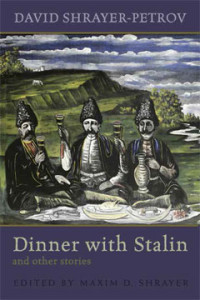Guest Post: Mark Shechner on Dinner with Stalin and Other Stories, by David Shrayer-Petrov
 Dinner with Stalin and Other Stories. By David Shrayer-Petrov, edited by Maxim Shrayer. Syracuse, NY: Syracuse University Press. 262pp. $29.95.
Dinner with Stalin and Other Stories. By David Shrayer-Petrov, edited by Maxim Shrayer. Syracuse, NY: Syracuse University Press. 262pp. $29.95.
Review by Mark Shechner
The present situation for Jewish writers and their readers bears little resemblance to the scene of just two decades ago. It has been so transformed as to be scarcely recognizable. If there is a prior state of affairs, however, in which our time can see itself in an historical mirror it would be the ferment of the early 20th century, the springtime of Jewish writing in America, when writers ambitious to speak for their culture and their moment commonly had at least two languages to choose from, Yiddish and English. We know that some even wrote in Hebrew, and who now remembers the names of those whose also wrote in Russian and Polish? Who recalls Dusk in the Catskills by Reuben Wallenrod, published in 1957? Wallenrod doesn’t appear in any of the standard histories. Nor will he any time soon. He wrote fiction in Hebrew.
The contemporary moment recycles history in this sense: much of it is fueled by émigrés from abroad who work in multiple languages: a handful still in their native tongues, but most in English, sometimes a decentered English under the tonal canopy of another language. The FSU (former Soviet Union) writers are the most remarkable cases in point. 2014 alone has seen the publication of books by Lara Vapnyar (The Scent of Pine), Anya Ulinich (Lena Finkle’s Magic Barrel: A Graphic Novel), Gary Shteyngart (Little Failure: A Memoir), Boris Fishman (A Replacement Life), David Bezmozgis (The Betrayers), and David Shrayer-Petrov (Dinner with Stalin and Other Stories). And that is just a single year’s production. These writers are either themselves members of the refusenik generation that forced open the prison gates of the Soviet Union in the 1970s and 1980s or their children. Wherever they settled, they brought with them their passion for the written word, their febrile imaginations, and their stories.
David Shrayer-Petrov, born in 1936, continues to write in Russian, though he has lived in the United States since 1987 where, besides writing, he has worked as a doctor. Though he has a reputation in Russian émigré circles, his name is little known in American discussions, even though Syracuse University Press has previously published two volumes of his fiction: Jonah and Sarah: Jewish Stories of Russia and America (2003) and Autumn in Yalta: A Novel and Three Stories (2006). Both books were edited by his son Maxim Shrayer, a professor at Boston College and himself a fiction writer: Yom Kippur in Amsterdam (Syracuse, 2012). (more…)


